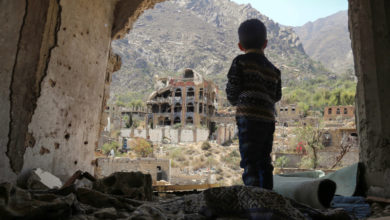According to reports, at least three ballistic missiles, but possibly as many as seven, struck a Saudi military camp near the Yemeni border on Wednesday evening, with numerous casualties reported.
According to a statement by the Houthi armed forces in Sana’a, a series of ballistic missiles also struck targets in Yemen’s Ma’rib and Taiz governorates.
The attack on Dhahran al-Janub, a Saudi base just across the border in Saudi Arabia’s ‘Asir Region, included three ballistic missiles and “resulted in the killing and wounding of large numbers of Saudi enemy officers and soldiers,” the statement said, including the commander of the Saudi First Regiment, Mansour Ali al-Asmari.
Two ballistic missiles also targeted a training camp west of Taiz, a province in southwestern Yemen deep in government-held territory, although the statement did not say which member of the coalition used the training camp.
Targets along the eastern front in Ma’rib were also hit by a pair of ballistic missiles.
The Saudi-led coalition, which includes the Yemeni government of President Abdrabbuh Mansour Hadi based in Aden, has made no comment on the operation as of yet. However, earlier on Wednesday, the Royal Saudi Air Defense Forces (RSADF) claimed to have shot down three Houthi ballistic missiles targeting the kingdom’s southern provinces. It is unclear if they refer to the same three launched at Dhahran al-Janub.
Seven Years of Resistance
Pro-Houthi social media users suggested the number of ballistic missiles, seven, was symbolic of seven years of resistance by the Zaidi Shiite movement, which is formally named Ansarullah but commonly called after the Houthi tribe at its core.
The events that led to the civil war began in September of 2014, including the Houthi entry into Sana’a, which did not immediately force Hadi from office. However, on November 9 of that year, following United Nations Security Council pressure to preserve the peace, which included placing sanctions on ousted former President Ali Abdullah Saleh for his pro-Houthi positions, the Houthis walked out of a Peace and Partnership government orchestrated by Hadi, being joined by Saleh’s General People’s Congress party. Hadi was also a GPC member.
The incident set in motion Hadi’s ouster two months later, which sent him fleeing to Riyadh looking for Saudi help returning to power. The Saudi-led coalition, which included the United Arab Emirates, Sudan, Morocco, and the United States, launched a devastating air and ground campaign against the Houthis in March 2015.
Major Breakthrough in Ma’rib Offensive
The operation comes amid a prolonged Houthi offensive to gain control of Ma’rib Governorate, an oil-rich province that is Hadi’s last stronghold in northern Yemen. Fighting has been intense over the last two months, with the Saudis launching a devastating air counteroffensive in mid-October.
However, on Monday, Houthi forces reported a major breakthrough in eastern Ma’rib as their forces punched through government lines and reached within 15 kilometers of the state’s border with Hadhramaut Governorate.
Last week, the Pentagon announced it had received approval from the US State Department to potentially sell AIM-120 Advanced Medium Range Air-to-Air Missiles (AMRAAM) to the Saudi military, saying they are necessary to intercept Houthi missiles and drones used to attack targets inside the kingdom. The US said earlier this year it was ending its support for offensive operations by the Saudi-led coalition, but US President Joe Biden added that he would continue to cooperate militarily with Saudi Arabia and to supply it with defensive systems.
However, with the Houthis fighting an attrition war against a foreign attacking army, the US helping support Saudi Arabia’s defensive systems is still support for its war effort in Yemen itself.
Following the UN, Biden’s administration has called the war an unwinnable stalemate and urged peaceful negotiations to end the conflict in Yemen, which has killed more than 250,000 Yemenis, the majority of them through indirect causes attributable to the collapse of infrastructure due to the war, such as shortages of medicine, food, and potable water.
While the UN has condemned recent Houthi attacks on Saudi targets, it did not mention the Saudi air blitz in Ma’rib happening at the same time, which Riyadh claimed had killed more than 1,300 people in a week’s time.






